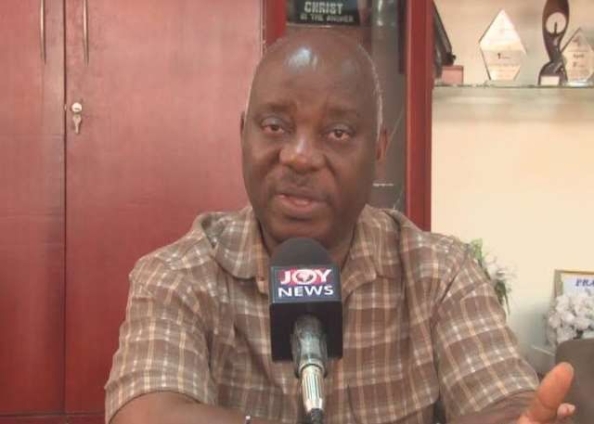A former General Secretary of the Christian Council of Ghana Rev. Dr. Fred Degbe has called on Ghanaians to end the growing trend of vote buying and selling, a practice fuelling political corruption and hindering national progress.
He highlighted the troubling trend where people seeking elective positions purchase votes to secure their positions. He explained that these candidates often seek to recoup their investments through corrupt practices, thereby stalling the country's development.
The former General Secretary of the National Peace Council made the statement during a public lecture at the University of Education in Winneba at the 10th anniversary of the political science Education department of the school, on the theme, ‘Towards a peaceful 2024 election in Ghana: collaborations among stakeholders in the context of emerging technologies.’
According to the 2021 Population and Housing Census data, 7,317,555 people, or 24.3% of the household population, were identified as multidimensionally poor. Among this group, 43.8% faced severe poverty, experiencing deprivation across multiple dimensions simultaneously.
Rev. Fred Degbe admitted the fact that poverty was one of the reasons for such an act but emphasized the importance of integrity in the voting process, stating that, “no amount of monetary inducement should sway voters from exercising their civic duty with integrity.”
Vote buying typically involves offering gifts, money, or other incentives in exchange for votes during elections. Mr Degbe cited recent instances during the parliamentary and presidential primaries of both the New Patriotic Party (NPP) and the National Democratic Congress (NDC), where this unethical practice was prevalent.
The practice is not only unethical but also illegal. The Representation of the People Act, 1992 (Act 284) explicitly prohibits vote buying, with violators subject to legal penalties. The Criminal Offences Act, of 1960 (Act 29) also criminalizes bribery in elections, underscoring the serious legal consequences of such actions.
Rev. Degbe urged all stakeholders including students at the political science department of the University of Education to be ambassadors of change to curb the canker.
He also urged the media to avoid giving a platform to politicians who use their influence to insult opponents or incite violence, especially as the December elections draw near.
He identified the culture of insults, misinformation, vote-buying, and ethnic divisive campaigning as significant threats to democracy in Ghana. He encouraged the students and all stakeholders to do their part towards a peaceful 2024 elections in Ghana.
Latest Stories
-
Expansion Drive: Takoradi Technical University increases faculties
4 hours -
SHS heads demand payment of outstanding funds before reopening of schools
4 hours -
We thank God for the 2024 general elections – Akufo-Addo
5 hours -
Coconut Grove Beach Resort marks 30 years of excellence with memorable 9 lessons & carols service
5 hours -
WAFU B U-17 Girls’ Cup: Black Maidens beat Nigeria on penalties to win inaugral tournament
5 hours -
Real Madrid beat Sevilla to keep pressure on leaders Atletico
7 hours -
Liverpool put six past Spurs to go four points clear
7 hours -
Manchester United lose 3-0 at home to Bournemouth yet again
7 hours -
CHAN 2024Q: ‘It’s still an open game’ – Didi on Ghana’s draw with Nigeria
7 hours -
CHAN 2024Q: Ghana’s Black Galaxies held by Nigeria in first-leg tie
8 hours -
Dr Nduom hopeful defunct GN bank will be restored under Mahama administration
8 hours -
Bridget Bonnie celebrates NDC Victory, champions hope for women and youth
8 hours -
Shamima Muslim urges youth to lead Ghana’s renewal at 18Plus4NDC anniversary
9 hours -
Akufo-Addo condemns post-election violence, blames NDC
10 hours -
DAMC, Free Food Company, to distribute 10,000 packs of food to street kids
11 hours

